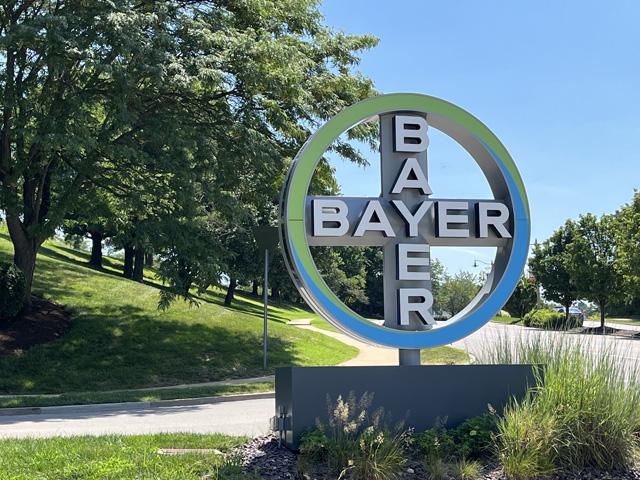Bayer Loses Missouri Roundup Appeal
Missouri Appeals Court Upholds $661 Million Glyphosate Verdict Against Bayer
LINCOLN, Neb. (DTN) -- A state appeals court in Missouri on May 27, 2025, affirmed a trial court's $661 million product-liability judgement in favor of four plaintiffs who alleged Bayer's active ingredient glyphosate caused their non-Hodgkin's lymphoma.
On Nov. 17, 2023, a jury in the Circuit Court of Cole County found Monsanto, now owned by Bayer, liable on claims of strict liability for design defect of Roundup, strict liability for failure to warn and negligence in the cases of California resident Daniel Anderson, Jimmy Draeger and Brenda Draeger from Missouri, and New York resident Valorie Gunther.
The three-judge panel of the Missouri Court of Appeals Western District rejected all seven points of appeal filed by Bayer, calling out the company for its handling of glyphosate.
"Monsanto's awareness of studies demonstrating the possibility of a causal relationship between glyphosate and cancer, particularly NHL, and then its decision to double down on its defense of Roundup in lieu of changing the product's formulation or adding a warning label, demonstrates, at best, Monsanto's indifference to or reckless disregard of the health of its customers," the court said.
"Given the reprehensibility of Monsanto's misconduct as well as the goal to deter Monsanto from continuing its strategy of pursuing profit at the expense of the health of Roundup users, a nine-to-one ratio of punitive damages to compensatory damages was appropriate."
In a statement to DTN, Bayer said it disagrees with the court's ruling to not remit damages or remand the case for a new trial.
P[L1] D[0x0] M[300x250] OOP[F] ADUNIT[] T[]
"We continue to believe that the trial court committed significant errors by allowing inadmissible and prejudicial testimony into the courtroom which poisoned the jury against the company," the company said.
Bayer offered several points on appeal including the company's claim that the trial court erred in allowing expert testimony about another court's opinion, which the company argues is inadmissible in Missouri.
In addition, Bayer argued the trial court erred in allowing undisclosed expert testimony on glyphosate exposure calculations, by allowing billed medical expenses to figure into the final award, that the court allowed duplicative damages, and that the punitive damages awarded were "excessive."
Bayer also argued that the Federal Insecticide, Fungicide and Rodenticide Act in product labeling preempts state failure-to-warn laws.
Because there is a split among lower courts on that question, Bayer appealed to the Supreme Court for its consideration, https://www.dtnpf.com/….
Bayer told DTN that the "errors" committed at trial "resulted in an unconstitutionally excessive punitive" damage award.
"Even after the verdict was reduced, the ratio of punitive to compensatory damages is nine to one, which we believe is excessive and unconstitutional," the company said.
"In the majority of other cases which went to trial in Missouri, judges properly excluded inadmissible evidence, leading to positive outcomes for the company. Plaintiffs' claims are also preempted by federal law as the Third Circuit (U.S. court of appeals) recently held in Schaffner that state-based failure-to-warn theories are preempted by FIFRA which bars states from applying warning labels which are 'different from or in addition to' the label approved by the EPA."
Bayer said a "favorable ruling" by the Supreme Court could "largely curtail this litigation." The company said it would continue to defend its products in court.
Matthew Stubbs, managing partner at Duncan Stubbs who represented the four plaintiffs in Cole County, said in a statement that the Missouri appeals court's decision will have wide-ranging implications.
"The Missouri Court of Appeals decision sends a clear and powerful message -- no company, regardless of its resources or influence, can sidestep accountability when it comes to consumer safety," he said.
"The court's affirmation underscores the strength of our case and Bayer's weakening defense strategies. This ruling represents more than just a legal victory; it's a crucial step toward justice for the thousands affected by Roundup and a reassurance that the voices of victims continue to be heard."
Todd Neeley can be reached at todd.neeley@dtn.com
Follow him on social platform X @DTNeeley
(c) Copyright 2025 DTN, LLC. All rights reserved.





